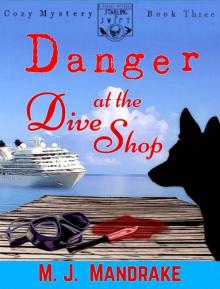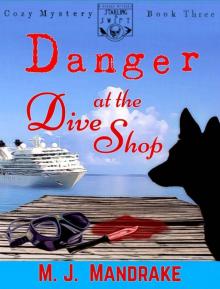- Home
- M. J. Mandrake
Sabotage on Solitude Bay Page 3
Sabotage on Solitude Bay Read online
Page 3
There was something about his expression that caught Kitty’s attention. “Your grandfather didn’t agree?”
“It broke his heart. Probably hastened his death,” Leander said. “He tried to buy Mark’s share, offered him way over the value, but he wouldn’t give. We thought Mark would turn it back into a private home, but he didn’t. It just sits empty.” He shrugged. “But that’s a good thing, I suppose. He’s not someone you’d want as a neighbor, let alone a business partner.”
“What a sad story,” Penny said.
“Yes. But there are still wonderful times to be had at the Golden Pelican,” Leander said, grinning. “Come on in.”
The children rushed up the wide, wooden porch steps. The smallest dropped a candy wrapper and her older sister stopped to pick it up. Penny and Elaine followed them, holding Toto and Jack by their leashes and looking oddly like mirror images themselves.
Chica nudged Kitty’s leg, hard, and Kitty looked around. There was no one behind her. Chica pressed against her knee, turning her toward the hedges. Kitty stared, trying to see what Chica was seeing.
“What’s wrong?” Leander asked, stopping beside them.
“I don’t know,” she murmured. “She’s definitely on high alert. Maybe she just senses my…” Stress. “Excitement,” she finished lamely. She hadn’t told him about Chica’s warning as they docked.
He leaned down and kissed her cheek. “Don’t worry,” he whispered. “They’re going to love you.”
Kitty smiled and tried to look as if she believed him.
“Come on. Let’s go inside,” he said.
Taking a deep breath, she nodded and started for the steps. It took a moment for her to realize Chica hadn’t moved. Looking back, Kitty saw her focused on the hedge between the houses. Her fur had gone up and her body was taught with energy.
“Chica,” she called and snapped her fingers. She didn’t usually order Chica around so sharply but they were in an unknown place and if Chica bolted away, Kitty would have to chase after her. She could just imagine herself bolting down the little path. Sundress, sparkly sandals, and all. On top of that vision came another, more serious one. What if the neighbor that was never home, was actually just very quiet? It wouldn’t take much to hide from a group that size. Kitty imagined Chica crashing through the hedge after the neighbor and putting the match to a decades’ long feud. Merry Christmas, everybody.
“No time for games,” Kitty said, grasping her collar. Chica gave her a puzzled look and reluctantly turned away from the hedge. As she trotted forward, she glanced back repeatedly, growling in her throat.
“Probably a squirrel,” Kitty said.
“Right. A squirrel,” Leander agreed as they joined the others at the front door. Just as he knocked he glanced over at Chica, then Kitty. The concern in his eyes confirmed her own growing dread.
Whatever Leander said about squirrels, they both knew Chica had sensed something far more destructive than a rodent. It was simply a matter of time until the full, terrible truth was revealed, and Kitty could only pray it didn’t involve any members of Leander’s family.
***
Kitty dropped into one of the rockers on the side porch and took a deep breath. “It hasn’t been that bad, really,” she whispered to Chica.
Giving her a skeptical look, Chica slumped to the porch as if exhausted. It had probably been more hectic for Chica than for Kitty. As a tour guide, she’d honed the ability to remember names, and meeting Leander’s whole family hadn’t been unlike greeting a rather rowdy group of cruise ship vacationers. The last hour had been filled with lots of laughter, people signing over one another, nosy questions, and teasing. Basically, it had been chaos, but a warm and friendly kind of chaos.
Taking a sip of the Long Island iced tea someone had pressed into her hand while she stood in the kitchen, Kitty pulled Jane Eyre from her satchel. She was too rattled to read it, but simply holding the book in her hands made her heartbeat slow. It was probably a physiological response to an engrained experience. She’d spent thousands of hours relaxing and reading, and now when she picked up a book, her body sensed the bibliophile’s equivalent of Pavlov ringing his bell and decided to relax on cue. Or perhaps scientists would discover that there was a sedative in the dust of leather-bound books. Whatever it was, Kitty was sure the old book was doing more for her nerves than the alcohol.
Children’s laughter floated toward her. The pool was behind the house and she could see most of it from where she sat. Older children jumped off the diving board and younger kids paddled around the shallow end. Three adults stood equal distances apart, watching. Leander had explained how the story of a terrible, traumatic drowning of a young woman in the bay many years ago had shaped the family’s approach to pool time. The fence around the pool was locked when it wasn’t in use, and when it was open, adults took turns as life guards.
The side porch where Kitty sought refuge had a lovely view of the sloping grass that ended far below in the famous white sands of Solitude Bay. Palm trees dotted the property line and the hedge tapered to almost nothing as it reached the beach. The sun was high in the sky, and the gentle waves reflected the rays with a thousand glints of light. Kitty had seen a lot of wonderful places in the last ten years of travel, and Solitude Bay was one of the most beautiful.
Kitty turned to look at the Perkins’ house next door. It was an equally large property and some of the backyard was visible from where she sat. Vines choked out the large hibiscus bushes and the palm trees looked the worse for wear.
Chia sat up and nudged her knee before she heard the door open on the porch. She turned to see Leander’s father walk through and close it softly.
“May I sit with you?” he signed.
“Of course.” Kitty hoped she didn’t look like she was hiding, even though she was doing just that.
He settled in the rocker beside her and for a while, they watched the children playing in the pool. Kitty felt painfully aware of every move she made. Mr. Estornell wasn’t imposing at all. If Kitty had passed him on the street, she wouldn’t have looked twice. But he carried a solemnness about him that was so different from Leander’s easy-going personality. Of course, in the beginning, Kitty had thought Leander didn’t have a personality at all. Only after surviving a near-death experience and chasing down a murderer together did she realize he was much more than a serious-looking man in a dark suit. Maybe Mr. Estornell would turn out to have a wicked sense of humor like Leander. Or maybe he was just what he seemed. Kitty decided not crack any jokes until she knew for sure.
“Leander says you come from a small family,” he said.
“Yes.” Kitty tried to think of something else to say. She was glad they were signing and not speaking because she was sure her voice would be shaking. Had she been this nervous when meeting her ex-fiancé’s family? She couldn’t remember.
“You sign very well.” His brown eyes were assessing.
Kitty knew what he was asking. “My parents are both deaf. I signed before I spoke.”
“And your brother?”
“He was born hearing, lost his hearing after college, and now has the implant.” Kitty felt a knot growing in her stomach. This conversation was fraught with minefields. There were topics that one just didn’t discuss at the dinner table or with strangers, like religion and politics, and a lot of deaf people considered cochlear implants an equally taboo subject.
The general public seemed to regard the device as a godsend, worshiping what they saw as a simple ‘fix’ for deafness. Everyone loved a video showing a deaf baby hearing its mother’s voice for the first time. What they didn’t know was that some in the deaf community saw the implant as the downfall of all that they held dear. It was a threat to their entire identity, everything they had worked for and accomplished, the generations of pride in their unique culture and language. Fixing what wasn’t broken was an insult.
Mr. Estornell watched the swimmers for a few minutes. “And you? When you lose your heari
ng, will you get the implant?”
“That’s a very personal question.” Chica lifted her head, sensing the stress in Kitty’s movements. Had Leander told his father about Kitty’s future hearing loss? Or did he just assume she would because her parents were deaf, she had a service dog, and her brother had lost his hearing?
He smiled slightly. “Leander is my only son.”
Kitty swallowed hard. She’d spent so much time worrying about Leander’s mother, a short, plump, red-cheeked woman who had hugged Kitty no less than five times and declared her to be the prettiest girl she’d ever seen. That last part had been a blatant lie because Leander’s sisters were flat-out beautiful, especially the two with Waardenburg’s. Their long, dark locks and shockingly blue eyes made Kitty feel like a plain Jane with bad hair. She would have felt invisible if everyone hadn’t been staring at her, probably trying to figure out why Leander had picked such a nobody to bring home.
Mr. Estornell went on. “There are three generations of my family here for Christmas. Most of them are deaf. If Leander brought a hearing woman who respected our culture into our home, it would be easier than a deaf woman who will choose the implant. It’s a betrayal of our community. It tells our children that they are born wrong and should be altered.”
She looked out at the ocean sparkling in the distance and chose her words carefully. “I believe a group thrives when it allows every person to follow his or her conscience. When life decisions are forced, even the most vibrant community starts to wither.”
He held her gaze and Kitty felt regret pulse through her. She shouldn’t have come to visit. She should have just kept her relationship with Leander as it was. Now she’d offended the patriarch and Christmas was going to be ruined. The next few days flashed before her and they were filled with tension and cold expressions.
“I can see why Leander likes you,” he said. “He’s a bit of a philosopher, too.”
Kitty had never thought of herself as a philosopher, but Mr. Estornell didn’t look angry, so she decided it was a compliment.
She was just starting to respond when something moved, catching her attention in the house next door. The third floor window remained empty, the lace curtain motionless. She could have sworn… An unsettled feeling swept over her. Could this beautiful place be the setting of something worse than complicated family relationships?
Kitty glanced down at Chica. She wasn’t growling, but she wasn’t dozing either. She faced out to sea, her ears slightly back, eyes focused on the beach down past the grass. Kitty reached out and rubbed her ears, giving Chica a special scratch around the collar. She didn’t respond.
Something was wrong in Solitude Bay, and it was only a matter of time before it touched them all.
Chapter Four
“They say such nice things about people at their funerals
that it makes me sad I’m going to miss mine by just a few days.”
― Garrison Keillor
Kitty did her best to focus on the conversation. There was no sense in sounding the alarm when she didn’t have any proof.
Mr. Estornell was saying, “Myself, I have never cared to explore the gray areas. There is right. There is wrong. No need to debate.” He shrugged. “Our family has thrived and grown because we have been vigilant about keeping away people who would undermine our way of life, who would exert their negative influences.”
Leander dropped into the rocking chair beside Kitty. “Who’s a negative influence?”
Kitty frowned at Chica. Usually she got a little heads up when someone was approaching. Just because she liked Leander didn’t mean Chica should stop letting her know when he was headed her way.
“We were just discussing cochlear implants,” Mr. Estornell said. “I asked her what she’s going to do.”
“Ah.” Leander gave Kitty a wink. “I forgot to tell you that my dad doesn’t do small talk.” Then he signed something in Catalan, and his father answered him briefly. She had just enough time to feel left out of the conversation before his father used American Sign Language again.
“You call it badgering, and I call it conversation. But don’t worry. She held her own and declined to answer. Maybe a habit she picked up from you, although I keep telling you there’s no need to be diplomatic with your own family.”
Leander laughed outright. “That’s exactly where diplomacy is needed, especially in a group this large.” He nodded toward the door. “Mom sent me out here to tell you she needs you.”
Mr. Estornell narrowed his eyes. “I find it hard to believe there is no one else in the kitchen who can help her.” He stood up and walked to the door. “I look forward to talking with you more, Kitty.”
She forced a smile as he went inside. As soon as he was out of sight, she slumped in her chair and whispered, “I think I just doomed my visit.”
“Not at all,” Leander said. “I probably should have prepared you a little more. My dad doesn’t mince words and he doesn’t talk about the weather unless there’s a hurricane on the horizon. He gets right to the point. I tell people that I learned diplomacy at my mother’s knee because living with six strong-willed sisters and a hard-headed father requires a lot of smoothing over.”
“So, you brought me here to get answers to the questions you didn’t want to ask?”
“Hardly.” Leander leaned back in the rocker and looked out at the kids playing in the pool. “I’d rather wait for you to share the answers instead of prying them out of you.”
“Prying?” Kitty couldn’t help feeling shocked. For months she’d felt like she knew so little about Leander’s life, and he knew everything about hers. But here she was meeting all of his relatives and visiting a home that had been in his family for generations. Sure, he’d kept that small fact about the six sisters quiet, but that was understandable. She, however, had never said why she didn’t really speak to her parents or brother, and she certainly hadn’t shared what had driven her to live in the Yucatan in the first place.
“Hey,” he said, taking her hand. “I didn’t mean to make you feel bad.”
She shook her head. “It’s just that I thought I was more forthcoming than I have been.” She sighed and drained her glass. “I need about ten more of these.”
“Now, now. You’d regret it in the morning.”
“Then I’ll sleep until noon. I’m a problem solver.”
They sat there smiling at each other until another movement from the Perkins’ house next door caught Kitty’s eye.
“What is it?”
“I could have sworn I saw the curtains move,” she said. “That’s twice now. But every time I look, there’s nobody there.”
“Maybe one Long Island Iced tea is enough for you,” Leander said. “You’re more of a virgin strawberry margarita girl, if I remember correctly.”
“Ha ha.” She couldn’t stop watching the window. “Are you sure there’s nobody living there? Maybe the son came back for Christmas.”
“Maybe. They could have parked the car around the back, I suppose. Unless they’re going to sit around in the dark, we’ll know tonight.”
The back door opened and Penny, Elaine, Toto and Jack appeared.
“Goodness,” Penny signed, wiping her forehead.
“Gracious,” Elaine added.
Toto looked like she was in heaven. She was a dog who was happiest in a large group. Jack simply looked happy to be outside, or maybe it was because the Webers were nowhere to be seen. Kitty wondered what it would be like for him to have his previous owners in the same house. As much attention as they paid to Jack when he lived with them, Kitty figured they wouldn’t give him a passing glance, but dogs were different. They were loyal far past the point other people had forgotten or moved on.
“Jorge’s got the kids playing some kind of ice breaker that involves holding one foot and passing an orange with your chin.” Elaine dropped into a rocker and sighed. “And I thought my nieces and nephews were a handful. But maybe it’s Leander’s fault. He’s the one who
gave them a bunch of candy.”
“Hey, I have to keep my ‘funcle’ status.”
“Funcle?” Penny asked.
The back door opened and one of Leander’s sisters walked onto the porch. Caterina was one of the two with Waardenburg’s Syndrome and her blue eyes seemed even more shockingly bright in the natural light. She wore her long dark hair in a braid over one shoulder and didn’t make any effort to cover the bright white streak. Kitty thought she was the sister who was the dentist, but she couldn’t remember for sure.
He finger spelled it again. “You know, the fun uncle. It’s all I have going for me. If I didn’t bring candy, nobody would give me the time of day.”
“Ridiculous,” Caterina said, leaning against the porch railing. “You’re the shining star, the most beloved youngest child and everyone’s favorite. And you know it.”
Leander grinned. “Are you saying that I’m your favorite sibling, Cat?”
“Only because you rarely visit. If I saw you more often, that might change,” she said.
“Cat, Kitty, and Leander,” Penny said. “And three dogs to even it out.”
There was a confused pause. Penny looked around. “Leander means ‘lion’, right? I just find it funny, since he said his name meant Starling. and yours is Swift…”
The group made a coordinated expression of understanding. Kitty glanced at Leander and he smiled. It really was odd, actually. “If you tell me your middle name is ‘Anne’, I’m going to be really unnerved,” Kitty said.
“I like her, Leander. Can we keep her? You can go back to Mexico, but leave Kitty and Chica here,” Cat said.
“It would be like living in paradise,” Kitty said, feeling a warm glow from the flattery. “But I have a bookstore and two cats back in Mérida.”

 Danger at the Dive Shop (A Starling and Swift Cozy Mystery Book 3)
Danger at the Dive Shop (A Starling and Swift Cozy Mystery Book 3) Murder at the Mayan Temple (A Starling and Swift Cozy Mystery Book One)
Murder at the Mayan Temple (A Starling and Swift Cozy Mystery Book One) Death on the Wind
Death on the Wind Sabotage on Solitude Bay
Sabotage on Solitude Bay Danger at the Dive Shop
Danger at the Dive Shop Chaos in Cuba (A Starling and Swift Cozy Mystery Book 4)
Chaos in Cuba (A Starling and Swift Cozy Mystery Book 4) Chaos in Cuba
Chaos in Cuba